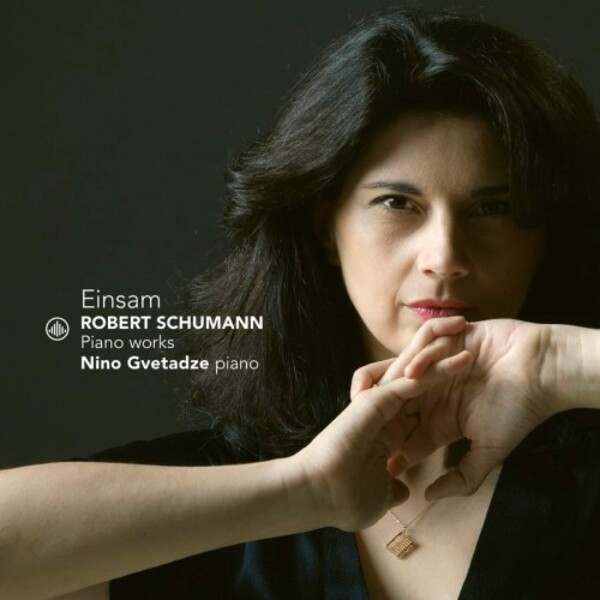
Schumann - Einsam: Piano Works
£14.20
In stock - available for despatch within 1 working day
Despatch Information
This despatch estimate is based on information from both our own stock and the UK supplier's stock.
If ordering multiple items, we will aim to send everything together so the longest despatch estimate will apply to the complete order.
If you would rather receive certain items more quickly, please place them on a separate order.
If any unexpected delays occur, we will keep you informed of progress via email and not allow other items on the order to be held up.
If you would prefer to receive everything together regardless of any delay, please let us know via email.
Pre-orders will be despatched as close as possible to the release date.
Label: Challenge Classics
Cat No: CC72855
Format: CD
Number of Discs: 1
Genre: Instrumental
Release Date: 9th October 2020
Contents
Works
Arabeske in C major, op.18Kinderszenen, op.15
Kreisleriana, op.16
Romances (3), op.28
Artists
Nino Gvetadze (piano)Works
Arabeske in C major, op.18Kinderszenen, op.15
Kreisleriana, op.16
Romances (3), op.28
Artists
Nino Gvetadze (piano)About
Written in the period 1838-9, the Kinderszenen, op.15, Kreisleriana, op.16, and Arabeske, op.18, are among the finest works in the composer’s output. During the late 1830s Schumann wrote numerous works for the piano, many of which met with considerable success.
The Arabeske in C, op.18, dates from early 1839. In a letter of 15 August Schumann described the piece, which was dedicated to Frau Majorin Friederike Serre auf Maxen, as “delicate – for ladies”, and it is true that it has a gently lyrical, dreamy quality. Yet there is more to the Arabeske than this modest description would suggest. Schumann had left Leipzig for Vienna in the autumn of 1838 after reaching an impasse in his relations with the Wiecks, and the keenness with which he felt the separation from Clara may be sensed in the Arabeske’s mixture of wistfulness and determination.
Of the piano music written by Schumann in the 1830s, just two collections include movement titles: the Phantasiestücke, op.12, and the Kinderszenen, op.15, of 1838. Schumann sketched 30 “cute little things” in early 1838, from which he chose 13 to create the Kinderszenen. The vivid movement titles were attached to each of the Kinderszenen after the music had been written, rather than inspiring the musical content. Yet the tender romanticism of these pieces – in Träumerei especially – suggests that Clara was never far from Schumann’s thoughts as he composed them.
Although Clara was a powerful source of inspiration for Robert, he was also profoundly influenced by both musical and literary sources, which helped him to make sense of his rich inner world. E.T.A. Hoffmann enabled Schumann to explore the different facets of his nature through the character of Johannes Kreisler, who appeared in several volumes including Hoffmann’s Fantasiestücke, one section of which is entitled ‘Kreisleriana’. Schumann strongly identified with Kapellmeister Kreisler: both men were devoted to the music of J.S. Bach, and both veered between extremities of mood, from ecstasy to despair.
This multifaceted nature is encapsulated in the eight movements of Kreisleriana, op.16. Kreisler’s brusque mood-swings are represented through Schumann’s contrasts between dazzling virtuosity and lyrical tenderness, often anchored by the tonal contrast between the key areas of G minor and B flat major. Schumann’s dual nature, previously communicated through Florestan and Eusebius, had found a new mouthpiece.
In contrast with the first decade of his career, which was almost entirely given over to piano music, Schumann did not write a great deal of solo piano music in the 1840s, producing just a handful of fugues and pieces for children. At the end of 1848 he began the Waldszenen (‘Forest Scenes’), a set of nine short piano pieces. ‘Vogel als Prophet’ is one of the more disturbing pieces in the set.
Reviews
 Her new CD ... is an unalloyed delight. Its programme ... coheres beautifully, and its title, which translates as lonely, has been adroitly chosen. Her manner with Kinderszenen “scenes from childhood” is sweetly conversational, and her Kreisleriana has a wonderfully relaxed eloquence. Her “Vogel als Prophet” is exquisite beyond words.
Her new CD ... is an unalloyed delight. Its programme ... coheres beautifully, and its title, which translates as lonely, has been adroitly chosen. Her manner with Kinderszenen “scenes from childhood” is sweetly conversational, and her Kreisleriana has a wonderfully relaxed eloquence. Her “Vogel als Prophet” is exquisite beyond words. I don’t know if I’ve enjoyed a Kreisleriana quite so much... Gvedatze’s focus is unerring and, if the expressive ontent of the music is always front and centre, she also has an uncanny ability to elucidate the overall structure with immense subtlety. If you don’t yet know her playing, great pleasures await.
I don’t know if I’ve enjoyed a Kreisleriana quite so much... Gvedatze’s focus is unerring and, if the expressive ontent of the music is always front and centre, she also has an uncanny ability to elucidate the overall structure with immense subtlety. If you don’t yet know her playing, great pleasures await. This is, quite simply, gorgeous... Natasha Loges
This is, quite simply, gorgeous... Natasha LogesError on this page? Let us know here
Need more information on this product? Click here